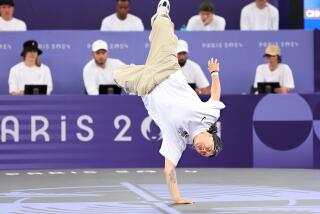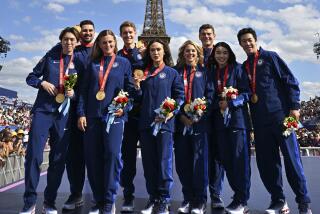Hartsell Siblings Are the Best of the Worst
- Share via
SALT LAKE CITY — The top pairs skaters in the country performed their “Ode to the Salt Lake Olympic Bid Committee” Friday night at the U.S. Figure Skating Championships, stumbling and crashing in full public view, turning what should have been a crowning moment into a humbling struggle for survival.
Kyoko Ina and John Zimmerman, favorites for the gold medal, wiped out during the first minute of their long program on a triple-twist maneuver, which ordinarily requires Zimmerman to toss Ina in the air and catch her. This time, however, Zimmerman bobbled and both skaters went down, nearly tumbling into the boards.
Still dazed, Zimmerman put both hands on the ice while landing his next jump and together they weathered the rest of the program, barely, eventually settling for the silver medal.
Likewise, the teams of Tiffany and Johnnie Stiegler and Laura Handy and J. Paul Binnebose wobbled and skittered across the ice, unable to capitalize on the mistakes of Ina and Zimmerman. Only the sister-brother team of Danielle and Steve Hartsell sustained their composure for a full 4 1/2 minutes, skating anxiously at times but cleanly throughout, and that was enough to earn them the gold medal.
“I can’t even describe what I’m feeling right now,” Danielle Hartsell said. “We worked so hard all this year for this. It’s awesome.”
Steve Hartsell acknowledged that their winning long program was “not our best skate ever. But we hung in there. We fought for everything with everything we had.”
Handy and Binnebose won the bronze despite a case of nerves so intense, Handy was gasping for breath during the final half-minute.
“We were a little tired because we got so worked up beforehand,” Handy said. “We were so nervous that by the end of the program, we were like, ‘Oh my God.’ We were drained.”
The Stieglers, who train at Lake Arrowhead, finished fourth after an error-ridden program that included a messy side-by-side double axel that left Tiffany sprawled on the ice and sent Johnnie stumbling as he fought to land the jump.
Searching for a silver lining, Ina said, hopefully, that “a huge mistake like that will help us in the long run. We need to evaluate what went wrong and find out, ‘OK, is it the way things are set up in the program, or was it nervousness and not being prepared for something like this to happen?’ ”
Earlier Friday, medals were awarded to the top three ice dance teams in the United States, a ceremony distinguished by the fact that half of the medalists weren’t from the U.S.
All three men--gold medalist Peter Tchernyshev, runner-up Mathew Gates and bronze winner Oleg Fediukov--are foreigners. Tchernyshev and Fediukov were born in Russia, where ice dancing is regarded a proud national pastime, rather than a dumping ground for skaters who can’t jump, and Gates hails from Hitchin, England.
Considering the United States’ lack of international success in ice dancing, this is a trend that makes some sense: If you can’t find a partner capable of joining you on the podium, import one.
“What we really wanted to find was a partner we can skate with,” said Eva Chalom, who teamed with Gates to win the silver medal. “I don’t think any one of us had it mind to find someone from overseas. That’s just the way it ended up.”
Tchernyshev won the gold with Naomi Lang, culminating a rapid ascent that began less than three years ago, when Tchernyshev wrote Lang a letter, asking if she was interested in forming a partnership. They began skating together in 1997, placed third at the 1998 nationals and now are U.S. champions.
Fediukov and Debbie Koegel won the bronze. The top two teams earned berths at the world championships, where American ice dancers have not finished higher than fourth since 1985. That streak figures to extend at least another year, but Lang preaches patience.
“As the years come, the American teams will develop,” she said. “We just have to give it time.”
*
Sara Wheat, a 14-year old from Swedesboro, NJ, landed four triple jumps, to win the junior women’s championship.
Laguna Niguel’s Sasha Cohen finished second despite a fall and a pair of two-footed landings. Jennifer Kirk of Newton, Mass., won the bronze.
More to Read
Go beyond the scoreboard
Get the latest on L.A.'s teams in the daily Sports Report newsletter.
You may occasionally receive promotional content from the Los Angeles Times.






